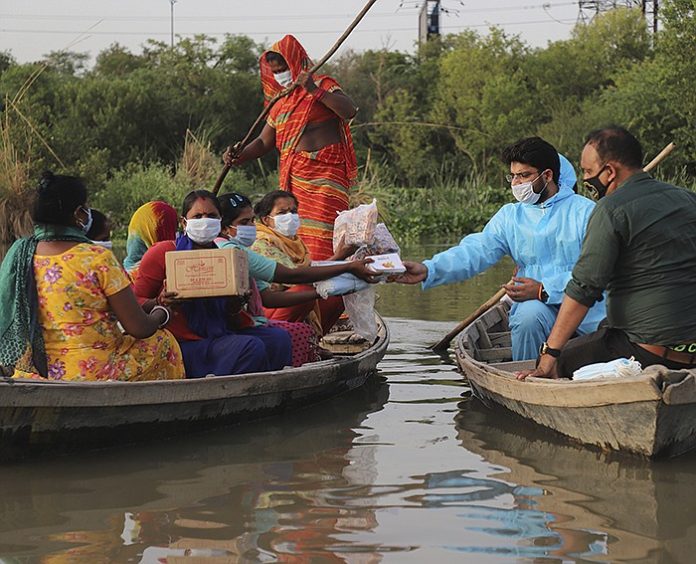WASHINGTON — President Joe Biden, facing a self-imposed July 4 deadline to have 70% of U.S. adults at least partly vaccinated against the coronavirus, tried Wednesday to rally the nation to meet that goal, announcing an offer of free child care for parents and caregivers while they receive their shots and a national canvassing effort resembling a get-out-the-vote drive.
Declaring June a “National Month of Action,” Biden appeared at the White House to ask Americans not only to get vaccinated, but also to help persuade their friends and neighbors to do so.
He laid out an aggressive campaign that will include incentives from sports leagues such as free tickets to the Super Bowl and to Major League Baseball games, and from private companies. United Airlines is offering a year of free flights in a sweepstakes open only to vaccinated Americans, and Anheuser-Busch has promised free beer to adults on Independence Day if the nation meets the president’s goal.
“That’s right, get a shot and have a beer,” Biden declared. “Free beer for everyone 21 years and over to celebrate the independence from the virus.”
[CORONAVIRUS: Click here for our complete coverage » arkansasonline.com/coronavirus]
Currently, 62.8% of American adults have received at least one coronavirus shot, according to the Centers for Disease Control and Prevention, and 12 states have passed the 70% mark; California and Maryland are the latest to do so. But a number of states, particularly in the South, are far short of that goal.
The rate of new vaccinations has slowed to an average below 555,000 per day, down from more than 800,000 when incentives such as lotteries were announced, and down from a peak of nearly 2 million per day in early April when demand for shots was much higher.
“We knew it was going to get harder,” Dr. Vivek Murthy, Biden’s surgeon general, acknowledged in an interview on CNN after the president spoke. Asked if the 70% mark is attainable, Murthy hedged, saying that if Americans “do everything that we have laid out today,” the nation could “absolutely still hit that goal, but nothing is guaranteed.”
The Biden administration views June as “a critical month in our path to normal,” Courtney Rowe, the director of strategic communications and engagement for the White House covid-19 response team, told The Associated Press.
Additionally, the White House is partnering with early childhood centers such as KinderCare, Learning Care Group, Bright Horizons and more than 500 YMCAs to provide free child care coverage for Americans looking for shots or needing assistance while recovering from side effects.
[Video not showing up above? Click here to watch » https://www.youtube.com/watch?v=jjjMBCJOef4]
The administration is also launching a new partnership to bring vaccine education and even doses to more than a thousand Black-owned barbershops and beauty salons, building on a successful pilot program in Maryland.
“Shots at the Shop” is a collaboration between the Department of Health and Human Services; the Black Coalition Against Covid-19, a Washington-based community organization; the University of Maryland’s Center for Health Equity; and the SheaMoisture hair products company.
The four partners are encouraging barbers and stylists to take part in a training session about the coronavirus vaccines this month and hold vaccination clinics in their shops in partnership with health providers, said Cameron Webb, a senior health equity adviser on the administration’s coronavirus response team.
Aiming to make injections even more convenient, Biden is announcing that many pharmacies are extending their hours this month — and thousands will remain open overnight on Fridays. The White House is also stepping up its efforts to help employers run on-site vaccination clinics.
Gallery: Biden speaks about covid-19 vaccination program
[Gallery not loading above? Click here for more photos » arkansasonline.com/63biden/]
As part of the effort to drive Americans to get shots, the White House is borrowing some tools from political campaigns, including phone banks, door-knocking and texting. The administration says more than 1,000 such events will be held this weekend alone. Additionally, it is organizing competitions between cities and colleges to drive up vaccination rates.
Biden also announced that he is assigning Vice President Kamala Harris to lead a “We Can Do This” vaccination tour to encourage shots. It will include first lady Jill Biden, second gentleman Doug Emhoff and Cabinet officials. Harris’ travel will be focused on the South, where vaccination rates are among the lowest in the country, while other officials will travel to areas of the Midwest with below average rates.
Other new incentives include a $2 million commitment from DoorDash to provide gift cards to community health centers to be used to drive people to get vaccinated. CVS launched a sweepstakes with prizes including free cruises and Super Bowl tickets. Major League Baseball will host on-site vaccine clinics and ticket giveaways at games. And Kroger will give $1 million to a vaccinated person each week this month and dozens of people free groceries for the year.
Wednesday’s announcement comes on the heels of other White House efforts intended to encourage vaccination, including a pledge by Lyft and Uber last month to provide free rides. An Uber spokesman said Wednesday that 60,000 people had taken advantage of the offer since it began offering the service last Monday. A spokeswoman for Lyft said the company had given “tens of thousands of rides” under the program.
The administration has also created a webpage, vaccines.gov/incentives.html, where Americans can learn about incentives for vaccinated people.
BIG WINNERS IN OHIO
The Ohio Lottery announced the next winners of the state’s Vax-a-Million vaccination incentive prizes Wednesday at the end of the lottery’s Cash Explosion TV show.
Jonathan Carlyle, of Toledo, won the $1 million prize and Zoie Vincent, of Mayfield Village in Cuyahoga County, won the college scholarship.
Republican Gov. Mike DeWine announced on May 12 that Ohio would use federal Coronavirus Aid, Relief, and Economic Security Act money to fund five $1 million prizes and five full-ride college scholarships as a way to revive interest in the covid-19 vaccinations.
More than 3.2 million Ohioans entered their names for a shot at the $1 million, up from the 2.8 million who had registered for last week’s drawing. More than 133,000 children entered their names for the scholarship, up from just over 104,000 last week.
The names were drawn Monday using a random number generator, to leave time to confirm recipients’ eligibility. Vax-a-Million is open to permanent Ohio residents who have received either the one-dose Johnson & Johnson vaccine or their first part of the two-dose Pfizer or Moderna vaccination.
Three more $1 million and college scholarship winners will be announced each Wednesday for the next three weeks.
DeWine’s proposal inspired similar vaccine-incentive lotteries in Colorado, Maryland, New Mexico, New York state and Oregon.
VACCINE HOPES
Meanwhile, scientists have found clues that the world’s leading covid-19 vaccines offer lasting protection that could diminish the need for frequent booster shots, but they caution that more research is needed and that virus mutations are still a wild card.
Critical studies are underway, and evidence is mounting that immunity from the mRNA vaccines made by Pfizer and Moderna does not depend exclusively on antibodies that dwindle over time. The body has overlapping layers of protection that offer backup.
Pfizer and Moderna have fueled booster questions by estimating that people might need yearly shots, just like with flu vaccinations, and the companies are working to have some candidates ready this fall. But companies will not decide when boosters get used. That will be up to health authorities in each country.
Other experts say boosters may be needed only every few years.
“I would be surprised if we actually needed a yearly booster shot,” said Dr. Paul Offit, a vaccine specialist at the Children’s Hospital of Philadelphia who advises the Food and Drug Administration.
They point to ways the immune system remembers the coronavirus so that once original antibodies fade, the body’s defenses can swing back into action if a person is exposed again.
“I’m pretty optimistic. I wouldn’t rule out the need for boosters, but the immune response so far looks actually quite impressive,” University of Pennsylvania immunologist John Wherry said.
Antibodies that form after vaccination or natural infection do wane naturally, but there’s evidence that those levels remain strong for at least six to nine months after mRNA vaccination and possibly longer. They also appear effective against worrisome virus mutants, at least for now.
Scientists do not yet know the level below which antibodies cannot fend off the coronavirus without additional help, known as the correlate of protection.
Dr. Anthony Fauci, the U.S. government’s leading infectious disease expert, told a Senate subcommittee last week that vaccine protection would not be infinite.
“I would imagine we will need, at some time, a booster,” Fauci said. “What we’re figuring out right now is what that interval is going to be.”
MISSOURI SPIKES
Separately, two neighboring counties in rural northern Missouri are seeing big increases in covid-19 cases, spikes blamed in part on new variants of the virus, and in part on the behavior of residents.
Health officials in Linn and Livingston counties are urging precautions to slow the spread of the virus, though they’re not certain residents will follow that guidance — both counties lag well behind the state and national averages in vaccinations.
The covid-19 hub for the Missouri Department of Health and Senior Services on Wednesday showed Livingston County with 348 cases per 100,000 residents over for the seven-day period ending Sunday, and Linn County with 243 cases per 100,000. The statewide average for the period was 27 cases.
The two counties combined have 27,000 residents.
Health officials in Livingston and Linn counties blame variants of the virus first identified in the U.K. and India.
Sherry Weldon, administrator of the Livingston County Health Department in Chillicothe, said the outbreak’s spread has come not from any single event but from several modest-sized gatherings.
“We’re not seeing a specific hotspot,” Weldon said. “We’re seeing several from churches, a business might have a few, but we’re also seeing a husband and wife and four of their kids.”
Dr. Kendal Geno, Linn County’s medical director, also has seen recent cases involving children, even infants. Re-infections also are common — Geno said people who first came down with covid-19 last year are getting sick again.
The surge has not led to new deaths, but Geno said some people have had to be hospitalized.
Linn County Health Administrator Krista Neblock said the variants spread because people refuse to follow mitigation guidelines.
“We have a large portion of our community that never wanted to wear masks,” she said.
Vaccination rates in both counties are low — 33.8% of residents in Livingston County and 33.9% in Linn County have initiated vaccination, compared with 41.8% statewide and 62.8% nationally.
Information for this article was contributed by Sheryl Gay Stolberg of The New York Times; by Zeke Miller, Andrew Welsh-Huggins, Julie Carr Smyth, Lauran Neergaard and Jim Salter of The Associated Press; by Tyler Pager, Lena H. Sun, John Wagner and Paulina Firozi of The Washington Post; and by Laura A. Bischoff of The Columbus Dispatch (TNS).

(AP/Amit Sharma)








